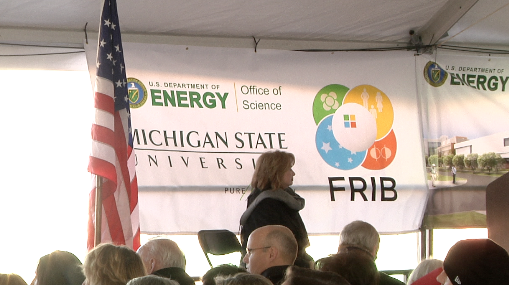FRIB Expected to Create $1 Billion in Economic Activity
- Published: 3/17/2014
- Comments
EAST LANSING - Groundbreaking ceremonies for the Facility for Rare Isotope Beams were held this morning at the work site on the corner of Bogue Street and Shaw Lane on Michigan State University's campus.
Speakers at the event included U.S. Sens. Carl Levin and Debbie Stabenow; U.S. Reps. Mike Rogers, Dave Camp and Tim Walberg; officials from the U.S. Department of Energy, the state of Michigan and MSU.
"Our university is becoming bolder everyday and that is by design," said MSU President Lou Ann K. Simon. "FRIB will be the core of our nations's research infrastructure, advancing knowledge in areas such as science, medicine and homeland security."
It's anticipated that FRIB will contribute nearly $1 billion in economic activity in the region, creating 5,000 construction jobs, 400 permanent jobs, and allow for 800 scientists to conduct their research.
“One day on this site, scientists using the most advanced technologies will bring us closer to answers to the really big questions,” said Senator Carl Levin.
“FRIB of course means growth, for Michigan’s economy. Thousands of jobs in construction and nuclear physics will make huge short and long-term contributions to Michigan’s economy," Levin said.
Not only will individuals in the state of Michigan be impacted by this, but each and every person in the country, worldwide.
Funding for the project comes from the federal government, the state of Michigan and MSU.
Later this spring the building will be complete and ready to host teams of engineers and scientists for research and development of the equipment that will make up the FRIB accelerator. Project completion is anticipated by June 2022.


 Spanish
Spanish Chinese (Simplified)
Chinese (Simplified) Korean
Korean French
French German
German Hindi
Hindi Urdu
Urdu Japenese
Japenese Arabic
Arabic Russian
Russian Farsi
Farsi
